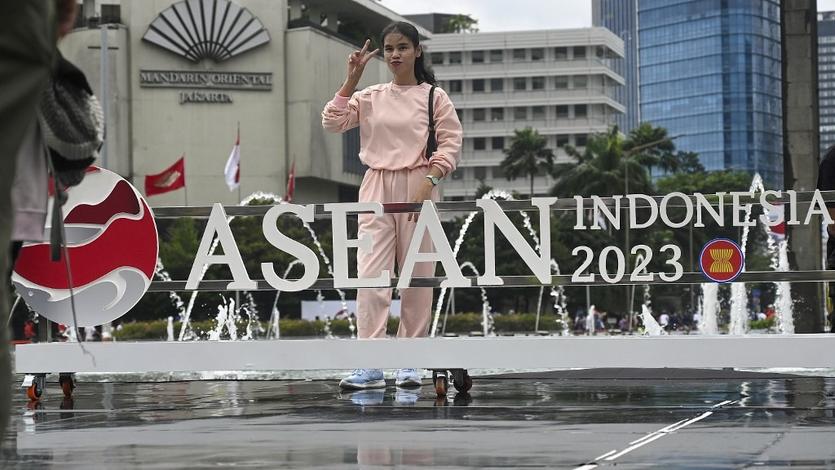 A woman poses with the newly set up logo of the Association of Southeast Asian Nations (ASEAN), as Indonesia officially assumes the group's chairmanship following a ceremony in Jakarta on Jan 29, 2023. (PHOTO / AFP)
A woman poses with the newly set up logo of the Association of Southeast Asian Nations (ASEAN), as Indonesia officially assumes the group's chairmanship following a ceremony in Jakarta on Jan 29, 2023. (PHOTO / AFP)
MANILA - Association of Southeast Asian Nations (ASEAN) economies must strengthen their positions in global value chains to bolster resilience against new challenges, including future pandemics, geopolitical instability, and climate change, says an Asian Development Bank (ADB) report released on Thursday.
The report ASEAN and Global Value Chains: Locking in Resilience and Sustainability surveys the challenges and opportunities facing global value chains in Southeast Asia as countries seek to build greater resilience and promote sustainability and green development.
READ MORE: China remains top destination for global FDI in Asia, says ADB
"As ASEAN countries continue their recovery from COVID-19, we must ensure that economic revitalization happens in a greener and more sustainable way," ADB President Masatsugu Asakawa said. According to him, the report proposes concrete measures that governments and businesses can take to decarbonize global value chains.
The report also finds that the competitive advantage of employing low-skilled labor diminishes as new technology upgrades global value chains, therefore, the region must create a critical mass of workers with the latest technology and technological skills
"Investments in renewable energy and improved efficiency, incentives to reduce trading costs for climate-smart goods, and the acceleration of digitalization can all contribute to greener and more sustainable value chains in ASEAN and beyond," he added.
The report finds that global value chains proved more resilient to the impacts of COVID-19 than expected, even as firms had to adjust to the disruption, given their dependence on only a few suppliers for essential inputs and goods. As such, the region needs to build stronger resilience in its global value chain segments while expanding trade, investment, and regional integration.
READ MORE: ADB trims growth outlook for developing Asia amid headwinds
The report also finds that the competitive advantage of employing low-skilled labor diminishes as new technology upgrades global value chains. Therefore, the region must create a critical mass of workers with the latest technology and technological skills.
It adds that ASEAN economies need to go "green." They should accelerate trade digitalization and promote climate-smart trade, green transport infrastructure, and carbon pricing. The best case is that policies promoting decarbonization strengthen ASEAN's global value chains.
The report notes that the stakes are high for ASEAN economies. Recent global shocks and geopolitical trade protectionism could disrupt growth in ASEAN and elsewhere. It explores the sizable policy impact and benefits of deepening Asia's trade cooperation and expanding it to include other regions.
ALSO READ: ADB to support coral reefs ecosystem in Asia-Pacific
The ADB launched the report on the sidelines of the Southeast Asia Development Symposium (SEADS) in Bali, Indonesia. SEADS, ADB's annual flagship knowledge event in Southeast Asia, gathers leaders from government, industry, academia, and other sectors to explore innovative solutions to critical issues such as climate change and technology development.
ASEAN groups Brunei, Cambodia, Indonesia, Laos, Malaysia, Myanmar, the Philippines, Singapore, Thailand, and Vietnam.



